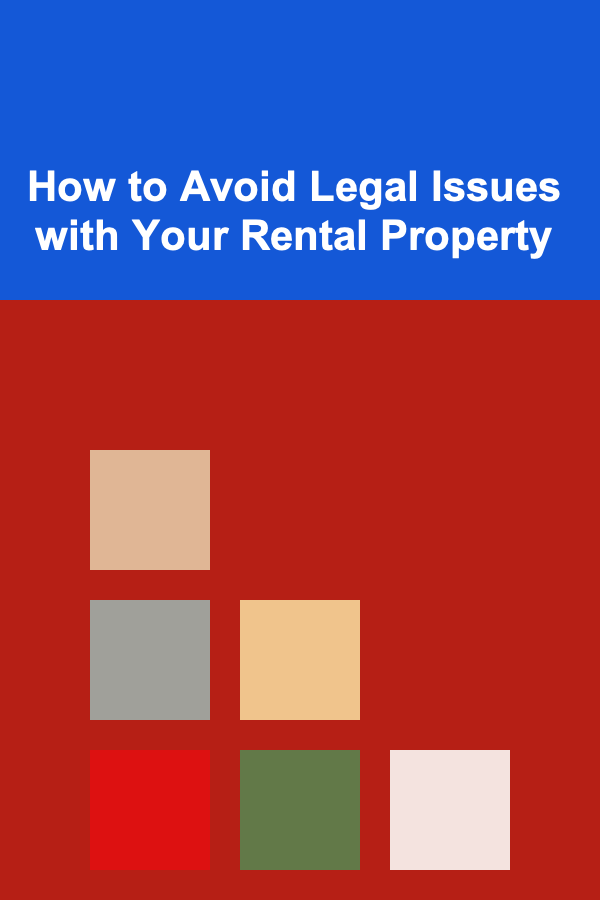
How to Avoid Legal Issues with Your Rental Property
ebook include PDF & Audio bundle (Micro Guide)
$12.99$5.99
Limited Time Offer! Order within the next:

Owning and managing rental properties can be a lucrative investment, but it also comes with its share of responsibilities, especially when it comes to legal matters. Navigating the legal landscape of renting out property can be complex, as there are numerous regulations, tenant rights, and landlord obligations to consider. Failing to understand and comply with these laws can result in costly legal issues, lawsuits, or even losing your property.
This article provides a comprehensive guide on how to avoid legal issues with your rental property. We will cover various aspects of property management, from lease agreements to tenant relations, maintenance obligations, and more. By understanding your legal responsibilities and best practices for preventing disputes, you can protect yourself, your property, and your tenants.
Understand and Follow Local Laws
The first and most important step to avoid legal issues with your rental property is to familiarize yourself with the local laws and regulations governing landlord-tenant relationships. These laws vary greatly depending on the country, state, or city you are located in. Landlord-tenant laws are designed to protect both landlords and tenants, but they differ from place to place, so it's crucial to understand the specific rules that apply to you.
Research Local Rental Laws
Start by researching landlord-tenant laws in your area. This can typically be done by visiting your local government website or consulting with a real estate attorney. Some key areas of law to pay attention to include:
- Rent control and rent increase limits: Many cities have rent control laws that limit how much and how often you can increase rent. Violating these laws can lead to fines or the inability to raise rent in the future.
- Eviction laws: Eviction laws specify the legal process for removing a tenant from your property. Understanding when and how you can legally evict someone, and the required documentation, is critical to avoid legal complications.
- Security deposit regulations: Most areas have specific rules governing the collection, handling, and return of security deposits. Be sure you understand how much you can charge, what it can be used for, and the time frame for returning it.
- Fair housing laws: The Fair Housing Act prohibits discrimination based on race, color, religion, sex, national origin, familial status, and disability. Make sure your rental practices are non-discriminatory and compliant with these laws.
Seek Legal Advice When Needed
Given the complexity of landlord-tenant laws, it's always a good idea to seek legal advice when needed. A real estate attorney can help you understand your rights, obligations, and any potential legal risks you might face as a landlord. They can also provide guidance when drafting or reviewing lease agreements, handling disputes, or navigating the eviction process.
Use a Legally Sound Lease Agreement
A well-drafted lease agreement is one of the most powerful tools to protect yourself from legal issues. The lease serves as the foundation of your relationship with your tenant, outlining the terms and conditions of the rental arrangement. A clear and comprehensive lease agreement reduces misunderstandings and can help resolve disputes if they arise.
Include All Necessary Terms
Ensure that your lease includes all necessary terms that protect both parties. Some essential clauses to include are:
- Rent amount and payment terms: Clearly state the amount of rent due, when it is due, and acceptable methods of payment. Be specific about late fees and the consequences of non-payment.
- Duration of the lease: Specify the length of the lease (e.g., one year) and any automatic renewal clauses or conditions for terminating the lease early.
- Maintenance and repair responsibilities: Outline who is responsible for maintenance and repairs, including both the tenant and the landlord. For example, tenants might be responsible for keeping the property clean and notifying the landlord of any issues, while the landlord is responsible for major repairs.
- Occupancy limits: Clearly state the number of people allowed to live in the rental unit and whether subletting is permitted.
- Security deposit: Include the amount of the security deposit, the conditions for its return, and the situations in which the deposit may be withheld (e.g., for damages beyond normal wear and tear).
- Pet policies: Specify whether pets are allowed, and if so, any restrictions or additional fees.
- Eviction procedures: Define the grounds for eviction and the procedures that must be followed if eviction becomes necessary.
Tailor the Lease to Local Laws
Make sure your lease complies with all local laws and regulations. In some jurisdictions, standard lease forms are available that are already in compliance with the law. However, you should still review the lease thoroughly to ensure it aligns with your specific situation.
Screen Tenants Thoroughly
Tenant screening is a critical step in preventing future legal issues. Properly vetting your tenants can help you avoid problems such as non-payment of rent, property damage, or legal disputes over lease violations. By choosing reliable, responsible tenants, you increase the chances of having a smooth and hassle-free rental experience.
Conduct Background and Credit Checks
Always perform background and credit checks before renting to someone. This will help you assess the tenant's financial responsibility, criminal history, and rental history. A tenant with a history of late payments or criminal behavior could pose a risk to your property and the safety of other tenants.
Verify Employment and Income
It's important to verify that your potential tenants have a stable income and are able to afford the rent. Ask for recent pay stubs, tax returns, or other proof of income to ensure that the tenant can meet their financial obligations.
Follow Fair Housing Laws
Ensure that your screening process does not violate fair housing laws. Avoid discriminatory practices based on race, religion, sex, or other protected categories. Treat all applicants equally and use consistent criteria when evaluating potential tenants.
Keep Accurate Records
Proper record-keeping is essential for avoiding legal issues. Keeping accurate records of communications, payments, and maintenance requests can help you defend yourself in case of a dispute with a tenant.
Document Everything
Maintain a detailed file for each tenant that includes:
- Lease agreement: Keep a copy of the signed lease agreement and any addendums or amendments.
- Payment history: Track all rent payments, including the dates, amounts, and methods of payment.
- Maintenance requests: Document all maintenance requests and the actions taken to address them, including any receipts for repairs or services.
- Correspondence: Keep copies of all correspondence with your tenant, including emails, letters, or text messages. This can serve as evidence if a legal issue arises.
Use Technology to Stay Organized
Consider using property management software to streamline record-keeping. These tools can help you track payments, manage maintenance requests, and store important documents in an organized manner. Technology can also send automatic reminders about rent due dates or upcoming lease renewals.
Respond Promptly to Maintenance Requests
As a landlord, you are responsible for keeping your rental property safe and habitable. Failure to maintain the property in a reasonable condition can lead to tenant complaints, health hazards, and even legal action. Responding promptly to maintenance requests not only keeps your tenants happy but also helps you avoid potential legal problems.
Understand Your Maintenance Obligations
In general, landlords are responsible for ensuring that the rental property is safe, habitable, and in compliance with building codes. This includes:
- Fixing broken appliances: If an appliance provided by the landlord (e.g., refrigerator, stove, or dishwasher) breaks, the landlord is typically responsible for repairing or replacing it.
- Ensuring structural integrity: You are responsible for the roof, plumbing, electrical systems, and other structural aspects of the property.
- Addressing health and safety issues: Landlords must address issues like mold, pests, heating or cooling problems, and other concerns that could affect the health and safety of tenants.
Respond Quickly to Tenant Concerns
When tenants request repairs or report issues with the property, address them as quickly as possible. In many jurisdictions, failure to make necessary repairs within a reasonable time frame can result in legal consequences. Additionally, tenants may have the right to withhold rent or even terminate the lease if the landlord fails to maintain the property.
Avoid Illegal Evictions
Evicting a tenant is a serious decision and should be done in strict accordance with the law. Illegal evictions can lead to lawsuits, financial penalties, and damage to your reputation as a landlord. Always follow the correct legal procedure when evicting a tenant.
Know the Grounds for Eviction
Some common grounds for eviction include:
- Non-payment of rent: If a tenant fails to pay rent on time, you may be able to evict them, but you must follow the proper legal procedure.
- Lease violations: If a tenant violates the terms of the lease, such as having unauthorized pets or subletting without permission, you may have grounds for eviction.
- Property damage: If a tenant causes significant damage to the property, you may need to evict them to protect your investment.
Follow the Legal Process
Eviction is a legal process that must be carried out according to local laws. This typically involves:
- Giving the tenant written notice of the violation or non-payment.
- Allowing the tenant a certain period of time to fix the issue or pay the overdue rent.
- Filing for eviction in court if the issue is not resolved within the specified time frame.
Never attempt to forcibly remove a tenant from your property without following the legal process, as doing so could lead to legal consequences.
Conclusion
Avoiding legal issues with your rental property requires a combination of understanding the law, maintaining clear and effective communication with tenants, and being proactive in handling maintenance and disputes. By following the tips outlined in this article, you can minimize your risk of legal problems, ensure compliance with local regulations, and create a positive rental experience for both you and your tenants. Staying informed, organized, and responsive will help protect your investment and keep your rental property running smoothly.

How to Create a Spa-Like Bathroom Cabinet with Essential Oils
Read More
How to Maintain Your Home's Exterior Paint to Avoid Fading
Read More
How to Maximize Space in Your Bathroom with Floating Fixtures
Read More
How to Save Money on Utilities in Your Rental Property
Read More
The Benefits of Wholesale Shopping: Why Buying in Bulk is a Smart Choice
Read More
Why Organizing Your Books by Genre Enhances Enjoyment
Read MoreOther Products

How to Create a Spa-Like Bathroom Cabinet with Essential Oils
Read More
How to Maintain Your Home's Exterior Paint to Avoid Fading
Read More
How to Maximize Space in Your Bathroom with Floating Fixtures
Read More
How to Save Money on Utilities in Your Rental Property
Read More
The Benefits of Wholesale Shopping: Why Buying in Bulk is a Smart Choice
Read More